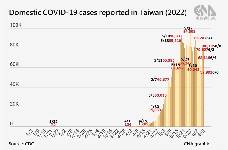
Taiwan COVID-19 News Briefs: June 8
ROC Central News Agency
06/08/2022 10:49 PM
Taipei, June 8 (CNA) Taiwan reported 80,223 new COVID-19 cases -- 80,195 domestically transmitted and 28 imported infections -- and 159 deaths from the disease on Wednesday, according to the Central Epidemic Command Center (CECC).
The 159 deaths is the highest-ever reported for a single day in Taiwan since the pandemic began in 2020, CECC data shows.
Here are some of the new developments regarding the COVID-19 situation around Taiwan on Wednesday:
Taiwan sees nearly 400,000 breakthrough infections
From January to mid-May this year, 398,837 people aged 18 and older who have received three doses of a COVID-19 vaccine experienced a breakthrough infection with the Omicron variant, accounting for 3.03 percent of the total of fully vaccinated individuals, according to the CECC.
Meanwhile, 145,621 people aged 12 and older who received two doses of a COVID-19 vaccine, experienced a COVID-19 breakthrough infection, accounting for 3.63 percent of the total.
To date, Taiwan has recorded 2,620,941 COVID-19 cases since the pandemic began in early 2020, including 2,607,613 domestic infections.
Taiwan began administering fourth COVID-19 vaccine shots for people aged 65 and above and other high-risk groups in May and is still evaluating whether to expand access to fourth shots to more people.

More doses of the Moderna vaccine have been administered in Taiwan than the government has officially received because recipients of the Moderna booster shot are given half the standard dose of the first and second jab.
COVID-19 surge to slow down next week: CECC
The daily number of new COVID-19 cases is expected to drop next week, Health Minister Chen Shih-chung (陳時中), who heads the CECC, said at the daily news briefing Wednesday, as the CECC reported more than 80,000 new cases for the second consecutive day.
Meanwhile, Taichung on Wednesday reported 11,587 new confirmed cases, the highest number among any cities or counties in Taiwan.
Chen said the sharp increase was because Taichung's COVID-19 infection rate has yet to reach 10 percent and daily caseloads will continue to rise until it reaches that level.
However, he said the nation's daily caseload is likely to fall next week but will take a little longer before it drops below 1,000.
The daily prescription rate of two oral COVID-19 antiviral drugs available in Taiwan exceeded 10 percent on Tuesday, Chen noted.
On Tuesday, a total of 11,427 courses of the two oral antiviral drugs were prescribed by doctors, including 9,102 courses of Paxlovid and 2,325 courses of molnupiravir, according to CECC data.
So far this year, Taiwan has used 130,504 courses of Paxlovid and 31,871 courses of molnupiravir, according to the data.

The figures do not include imported cases reclassified as domestic ones, nor retroactively removed cases. As of June 8, Taiwan recorded 2,593,010 domestic cases in 2022, while the total number of imported cases rose to 13,274 from 2,396 on Jan. 1.
Research team to study COVID-related encephalitis in children
The CECC has asked former Health Minister Lin Tzou-yien (林奏延), a pediatrician who specializes in infectious diseases and critical care, to lead a team carrying out genetic research into COVID-19-associated encephalitis in children.
The research proposal came as the number of children with COVID-19 developing acute encephalitis has been increasing amid Taiwan's latest COVID-19 outbreak.
To date, 42 children in Taiwan under the age of 13 years have developed severe COVID-19 infections, including 18 diagnosed with encephalitis and nine with pneumonia, according to CECC data.
A total of 16 medical center-level hospitals will participate in the research, according to the CECC.
CECC responds to dispute over the handling of bodies of deceased COVID patients
Chen on Wednesday responded to the controversy over whether there is a regulation stipulating that the remains of deceased COVID-19 patients must be cremated within 24 hours after death.
He said considering the many variables in the cremation process, the CECC has not given clear deadlines on cremation. It will discuss the issue with the Ministry of the Interior to come up with a solution that takes into account epidemic prevention and the needs of family members who have lost their loved ones.
Meanwhile, opposition Kuomintang (KMT) legislative caucus whip Tseng Ming-chung (曾銘宗) proposed that the CECC should reference the guidelines of the World Health Organization and other countries in managing the funerals of confirmed cases.
For instance, according to Singapore's practice, family members of deceased COVID-19 patients are allowed to attend the funerals of their loved ones within three days after death, according to Tseng.
In the early stages of the COVID-19 pandemic, it was required that the bodies of the infected must be wrapped in double-layered body bags and once sealed, the body bags could not be reopened, with cremation conducted within one day to reduce the risk of spreading the virus, according to Chen.
However, given increasing knowledge of the disease and its spread, the CECC will discuss the issue with the MOI in order to come up with a solution that is acceptable to all parties, Chen added.
Parents urged to look out for MIS-C signs in kids
The CECC on Wednesday urged parents to watch for symptoms of multisystem inflammatory syndrome in children (MIS-C), such as a persistent fever, in the six weeks following a COVID-19 infection as it reported the first-ever MIS-C case in Taiwan.
The case involved a 10-year-old boy, who tested positive for COVID-19 on April 26 and had a fever that lasted for two days. On May 28, he again developed a high fever, swollen lymph nodes, a rash, swollen extremities, red eyes, vomiting, and diarrhea.
He was diagnosed with MIS-C several days later, according to Lo Yi-chun (羅一鈞), deputy head of the CECC's medical response division.
MIS-C is a rare but potentially serious inflammatory reaction that largely affects children in the 6-12 age group about two to six weeks after they contract COVID-19, Lo said.
He urged parents to seek medical attention immediately for their children if they develop a persistent fever and one or two MIS-C symptoms in the six weeks following a COVID-19 infection.
MIS-C symptoms include abdominal pain, diarrhea, vomiting, skin rash, red eyes and dizziness.
(By Evelyn Kao)
Enditem/AW
|
NEWSLETTER
|
| Join the GlobalSecurity.org mailing list |
|
|
|

